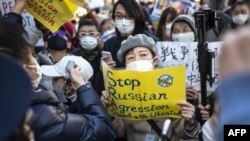The last time Singapore imposed unilateral sanctions against another country was 44 years ago, when it punished Vietnam for invading Cambodia, which was then called Kampuchea.
But this week, Singapore — a tiny Southeast Asian city-state that tries to avoid explicitly choosing sides between bigger countries — announced sanctions against Russia over its invasion of Ukraine.
"Unless we, as a country, stand up for principles that are the very foundation for the independence and sovereignty of smaller nations, our own right to exist and prosper as a nation may similarly be called into question," said Singaporean Foreign Minister Vivian Balakrishnan in a speech announcing the moves.
Many of East Asia's largest economies — from Japan to South Korea to Australia — announced similar moves, joining Western sanctions against Russia, or imposing their own, as they condemned Moscow's invasion. Some of Asia's biggest cities — including Bangkok, Tokyo, Seoul, and Sydney — also saw anti-war protests in support of Ukraine.
The anti-Russia sentiment was far from unanimous. Most prominently, China and North Korea have defended Russia's "legitimate security interests," saying the root cause of the conflict lies with the United States. In Southeast Asia, where many countries have strong economic and military ties with Russia stretching back to the Cold War, most governments have remained silent on the Ukraine issue.
But at least in some ways, Russia's invasion is threatening a lightning-quick reshape of Asian geopolitics, forcing even some countries who typically strive for neutrality in great power conflicts off the sidelines.
Singapore has been among the loudest critics of Russia's war. On Monday, Singapore announced it will impose export controls on items that can be used directly as weapons in Ukraine. It also said it would block certain Russian banks and financial transactions.
Singapore tries to avoid choosing sides, said Foreign Minister Balakrishnan as he announced the sanctions. "However, there will be occasions when we have to take a stand, even if it is contrary to one or more powers, on the basis of principles, as we are doing now," he said.
Singapore, with a population of under 6 million and no natural resources, "takes sovereignty very seriously," explained Lim Tai Wei, Adjunct Senior Research Fellow at the East Asian Institute of the National University of Singapore. "The thinking is that if a vulnerable country can be overrun, it can happen to other small countries, as well," Lim told VOA.
US allies join effort
The United States, which has tried to coordinate a global campaign of pressure against Russia, has seen the most success among its friends and allies.
Japan this week joined the West in trying to limit the Russian central bank's access to foreign exchange reserves. It also said it would participate in international efforts to cut off Russian banks from the SWIFT financial payment system.
Japan, which last week unveiled measures targeting Russian President Vladimir Putin and other top Russian officials, also announced it will provide $100 million worth of loans and $100 million in emergency humanitarian assistance to Ukraine.
The moves amount to a major shift for Japan, which had in recent years pursued engagement with Russia, to reduce tensions and solve the countries' territorial dispute over four northwest Pacific islands.
"The merits of this approach were already in question, but Russia's invasion of Ukraine has made it untenable. This will necessitate a major rethink of Japan's Russia policy," wrote James D.J. Brown, an associate professor of Political Science at Temple University's Japan campus.
South Korea, another U.S. ally, has also taken a more forceful approach, especially as Russia's war in Ukraine becomes more violent. South Korea's Ministry of Foreign Affairs on Monday announced Seoul will exclude Russian banks from SWIFT and will ban shipments of "strategic items," which could include things like semiconductors, navigation and avionics equipment, and other electronics.
In response, the Kremlin's ambassador to Seoul, Andrey Kulik, warned that South Korea-Russia ties could "change course" after developing positively for 30 years, according to South Korea's Yonhap news agency. The ambassador also threatened to withhold Russian support from cooperation projects involving North and South Korea. Although such projects are virtually non-existent now, restarting them is a major priority for South Korean President Moon Jae-in, who leaves office in May.
Taiwan's government, a democracy that has resisted threats from the much more powerful China, has also condemned Russia's "savage war" and said it will help fight "the expansion of authoritarianism."
Australia has called Russia's invasion "brutal" and imposed sanctions. New Zealand, meanwhile, has also condemned the Russian war and imposed travel bans, but does not have an independent sanctions law that would allow it to further target Moscow.
ASEAN neutrality
The situation is more complicated for countries in Southeast Asia — including Cambodia, Laos, Myanmar, and Vietnam — which maintain close ties with Russia.
Last week, the Association of Southeast Asian Nations (ASEAN) released a statement on Ukraine that refrained from describing Russia's actions as an "invasion." In fact, the statement did not mention Russia at all, instead calling for "all relevant parties" to exercise restraint.
"ASEAN is probably striving for near neutrality because as you can see nearly half of ASEAN has long-term traditional relations with Russia," according to Lim, the professor at the National University of Singapore.
However, Thailand and the Philippines, both ASEAN members, are U.S. allies, Lim said. "So, on the balance of probability, this makes ASEAN internally reach a kind of balanced equilibrium in their individual and coordinated response to the events in Ukraine," he added.
In a statement Monday via Twitter, the Philippines Department of Foreign Affairs expressed "explicit condemnation of the invasion of Ukraine" and said it would vote in favor of a United Nations General Assembly resolution condemning Russia's actions.







